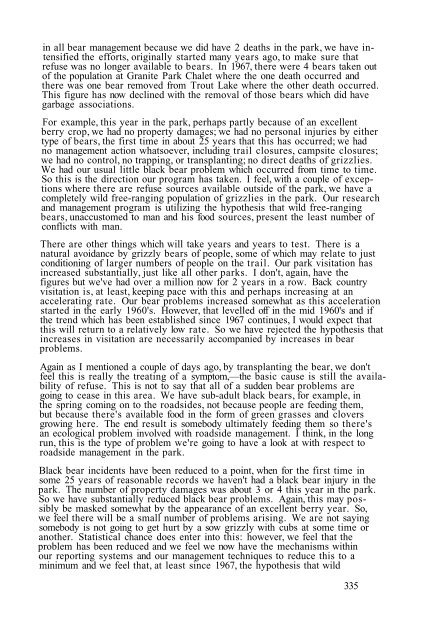Bears - IUCN
Bears - IUCN
Bears - IUCN
You also want an ePaper? Increase the reach of your titles
YUMPU automatically turns print PDFs into web optimized ePapers that Google loves.
in all bear management because we did have 2 deaths in the park, we have intensified<br />
the efforts, originally started many years ago, to make sure that<br />
refuse was no longer available to bears. In 1967, there were 4 bears taken out<br />
of the population at Granite Park Chalet where the one death occurred and<br />
there was one bear removed from Trout Lake where the other death occurred.<br />
This figure has now declined with the removal of those bears which did have<br />
garbage associations.<br />
For example, this year in the park, perhaps partly because of an excellent<br />
berry crop, we had no property damages; we had no personal injuries by either<br />
type of bears, the first time in about 25 years that this has occurred; we had<br />
no management action whatsoever, including trail closures, campsite closures;<br />
we had no control, no trapping, or transplanting; no direct deaths of grizzlies.<br />
We had our usual little black bear problem which occurred from time to time.<br />
So this is the direction our program has taken. I feel, with a couple of exceptions<br />
where there are refuse sources available outside of the park, we have a<br />
completely wild free-ranging population of grizzlies in the park. Our research<br />
and management program is utilizing the hypothesis that wild free-ranging<br />
bears, unaccustomed to man and his food sources, present the least number of<br />
conflicts with man.<br />
There are other things which will take years and years to test. There is a<br />
natural avoidance by grizzly bears of people, some of which may relate to just<br />
conditioning of larger numbers of people on the trail. Our park visitation has<br />
increased substantially, just like all other parks. I don't, again, have the<br />
figures but we've had over a million now for 2 years in a row. Back country<br />
visitation is, at least, keeping pace with this and perhaps increasing at an<br />
accelerating rate. Our bear problems increased somewhat as this acceleration<br />
started in the early 1960's. However, that levelled off in the mid 1960's and if<br />
the trend which has been established since 1967 continues, I would expect that<br />
this will return to a relatively low rate. So we have rejected the hypothesis that<br />
increases in visitation are necessarily accompanied by increases in bear<br />
problems.<br />
Again as I mentioned a couple of days ago, by transplanting the bear, we don't<br />
feel this is really the treating of a symptom,—the basic cause is still the availability<br />
of refuse. This is not to say that all of a sudden bear problems are<br />
going to cease in this area. We have sub-adult black bears, for example, in<br />
the spring coming on to the roadsides, not because people are feeding them,<br />
but because there's available food in the form of green grasses and clovers<br />
growing here. The end result is somebody ultimately feeding them so there's<br />
an ecological problem involved with roadside management. I think, in the long<br />
run, this is the type of problem we're going to have a look at with respect to<br />
roadside management in the park.<br />
Black bear incidents have been reduced to a point, when for the first time in<br />
some 25 years of reasonable records we haven't had a black bear injury in the<br />
park. The number of property damages was about 3 or 4 this year in the park.<br />
So we have substantially reduced black bear problems. Again, this may possibly<br />
be masked somewhat by the appearance of an excellent berry year. So,<br />
we feel there will be a small number of problems arising. We are not saying<br />
somebody is not going to get hurt by a sow grizzly with cubs at some time or<br />
another. Statistical chance does enter into this: however, we feel that the<br />
problem has been reduced and we feel we now have the mechanisms within<br />
our reporting systems and our management techniques to reduce this to a<br />
minimum and we feel that, at least since 1967, the hypothesis that wild<br />
335

















